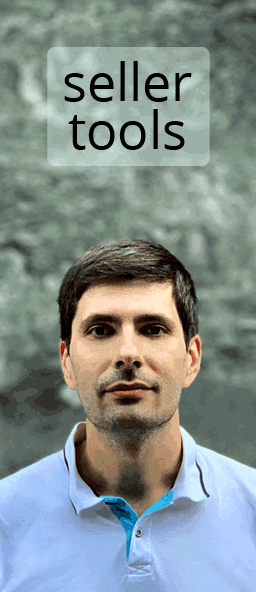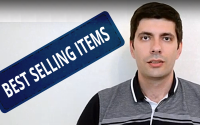The following are some eBay selling tips for beginners and a bunch of other useful tips that I wish I had when first starting out. Please keep in mind that eBay is really on your side all along, even though they might not make it look that way. Virtually all income they have is coming from you because they take a cut from every sale you make.
eBay selling tips
The following tips will help you make more sales as a beginner on eBay:
- The customer (buyer) is nearly always right
- Sell your less expensive items first, and get positive feedback
- Research your items before selling them
- Consider attachments and add-ons for existing major products
- Look to speed up your listing process
eBay is very interested in helping you sell more. That's because eBay takes roughly 15% in fees and transaction costs. The more business you do online, the better off eBay is, so you should think of it as a partnership.
Officially though, eBay has a lot of processes set up to support the buyer. Some examples are returns or resolutions of disputes, where eBay tends to just side with the buyers. But unofficially, I'm convinced that no one at eBay likes these procedures - especially when they're abused by buyers.
It might seem difficult at first, but as you go along and get used to selling your merchandise, you'll see it's not rocket science. That being said, some strategies should be used by beginners to ensure better chances for long term success.
Your eBay feedback is most important
When you first start selling, make sure you only get positive feedback. Or the flip side of this, make sure you never get negative feedback. Now, you might say "that's obvious", but it isn't. Think about your buying behavior here. If you go on some listing and notify the seller only has 95% positive feedback, you probably distrust that seller right away.
But think about it, to have a 95% rating, a seller didn't succeed at only 1 out of 20 transactions. And eBay even goes further by banning sellers who go much further down.
This all means that if a buyer has any dispute with you whatsoever, you should be polite and immediately offer a full refund and return. In case the issue ever escalates to eBay (unlikely, but it happens), they will be more likely to side with you because you can't do much more than give back the payment. And remember to communicate with buyers only through the official eBay messaging system and stay polite.
But, what happens if you don't offer a refund and the issue escalates to eBay? Guess what - eBay will give the refund on your behalf, and will watch you like a hawk from then on. Better to do this yourself from the start.
What if the buyer gets a refund and still leaves negative feedback? As long as you used eBay's message system and stayed polite, eBay will very likely rule in your favor because no legal damages were happening.
Have a look at these FUNNY eBay feedback examples!
Sell your more expensive items later
This is the biggest mistake I see a lot of new sellers making. Start by selling your cheapest products first. This way, you get some initial experience with lower risk. For example, you'll learn how to take better photos on your cheaper items and then you'll apply your new skills on your expensive items.
But there's a bigger reason still, and that's potential earnings. You see, all first-time sellers end up selling their first items at the steepest discounts. The buyer market won't trust you with any serious payments until they can see good feedback and at least some selling history backing you up. Now that you know your first items will be heavily discounted, you might as well part with your least expensive stuff first.
Then, once you have some feedback, and all positive, you can try selling more expensive things. But at that point, you will have more trust, and you'll get much better income (maybe even a profit).
The point is, if you sell your most precious products first, then the longer term you will have thrown a lot of potential income out the window.
This brings me to a very critical online sales topic that few people talk about: trust. When you finally do start selling expensive things, and even when you have a lot of great feedback, a buyer still needs a bit of a push to go for a transaction. In your listing, mention that you're willing to talk by phone, or you can show the item via Skype. And even though you'll probably never get a call, you're still building trust and this is super important for the customer.
Do your research, don't sell something no one wants
One common misconception for beginners is, if you get a few sales for a particular item, then you can get rich by selling more of that same thing. And this is just not true. In general, you should research the demand for your products, and be meticulous when you try to sell many of the same things. Study your product sell-throughs and prices and trends.
Don't try to be a pioneer or inventor. A lot of beginners think they have a small invention that no one ever sold, and everyone will buy for sure. You might get lucky and this is true, but it's really like a lottery - chances are no one will buy your product. Instead, look for items that already sell well, and just repeat the process. Let someone else be the first to take the risk, and you'll be second in line to make a lot of money too.
By the way, this is another point I always like to push because few follow it. And it's even valid in many other areas in life, not just selling. Look what other successful people are doing or selling, and then do that. At least you're guaranteed a market, and if you manage to compete then you'll do well. But if you have no market, to begin with, then it doesn't matter how hard you work.
Think attachments and add-ons
Let me bring up an example from an experience I had. So, I'm a coin collector. A long time ago I sold a coin collection, all as one auction. This was mostly out of laziness, and I paid the price. What happened was, sure there was some bidding activity, but my item was looking for a buyer who wanted every coin, and I had lots of different coins here. My auction sold, but at a low price... just a little above my reserve price. Realistically, I think if I had split up my auction into several listings, I probably would have made twice the money.
So, always consider splitting your listing into several, if possible. When you do this, the number of people looking at your items goes up, and with that, the final sales price also goes up.
Going further with this concept, the next tip I have is to think about add-ons. For example, selling robot vacuum cleaners is big business. But from my research, I can see that selling robot vacuum cleaner batteries is also big business, which not many sellers get into because it's a niche. The more little add-ons you're able to sell for popular items, the more sales you'll have overall. And you'll generally have lower competition.
Look to optimize your sales and listing processes
What you should do at all times is, please keep a timesheet of where your time goes. For example, how long does it take you to take pictures for a product? How long to list it, package and ship it, and so on? Are you spending an hour or 4 hours per listing? By keeping a record of where your time goes, you'll be able to calculate your hourly earnings, but more importantly, you'll know what you should practice and get better at. Unfortunately, most people would be disappointed if they counted their spent hours and then figured out their hourly income, but you have to face up to the truth and adapt yourself fast.
One of my main weaknesses is writing meaningful descriptions. I can spend a lot of time on that... but since I know I spend a lot of time here, I know I should practice this the most.
More eBay tips
Check out our other post about starting out selling on eBay, and items you might list that you probably already have. In that post, we cover some more tips, but more importantly specific items. Please also watch the video above, because there we cover several additional cool tips that you shouldn't miss.
All the information above is useful not only for eBay but can be applied in the same way to Amazon, Etsy, Shopify or any other online sales channel.
Please let me know if this was helpful in the comments section below, or if you have more tips to add here.
























Helpful, thanks!
Brand new seller here and just doing research. The info about breaking up the coin collection was great and wouldn't have thought of it. Thank you!
Great article
Being a newbie seller on eBay i am always looking for good experienced seller advice. This article was very good and rings true with others I have read.
Most important for myself is 100% great customer service 100% of the time. Even if i have to bite the bullet on profit with a difficult buyer, it is worth coming away with postive feedback.
Second most is research, research, research until I know my item completely.
Ebay has great customer services for sellers and are always happy to help sellers with any and all qurstions. 5
Good information
I appreciate the tips you offer! Thank you! It should be helpful knowing these things in the begining of my journey as a seller.